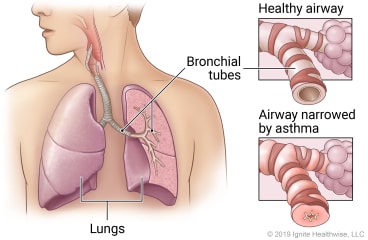
Asthma is a chronic condition that can make it hard to breathe. It causes the airways that lead to the lungs to swell and get inflamed.
Some people have a hard time breathing only at certain times. This may be during allergy season, when they get a cold, or when they exercise. Others have breathing problems a lot of the time.
When asthma symptoms suddenly get worse (or flare up), the airways swell and become narrower. This makes it hard to breathe, and you may wheeze or cough. These flare-ups are also called asthma attacks or exacerbations (say "ig-ZAS-ur-BAY-shuns").
Even though asthma is a chronic condition, treatment can help you feel and breathe better and help keep your lungs healthy.
When you have asthma, you may:
- Wheeze, making a loud or soft whistling noise when you breathe in and out.
- Cough a lot. This is the only symptom for some people.
- Feel tightness in your chest.
- Feel short of breath. You may have rapid, shallow breathing or trouble breathing.
- Have trouble sleeping because you're coughing or having a hard time breathing.
- Get tired quickly during exercise.
Symptoms may start soon after you're around things (triggers) that cause your asthma attacks. This is an early phase response. Or they may start several hours after exposure (late phase response). A late phase response can make it harder to figure out what triggers your symptoms.
Symptoms can be mild or severe. You may have symptoms daily or just now and then. Or you may have something in between.
Some people have symptoms that get worse at night, such as a cough and shortness of breath.
Asthma is treated with medicine to help you breathe easier, along with self-care.
Most medicines for asthma are inhaled. These types of medicines go straight to your airways, where the problem is.
The main medicines used to treat asthma include:
- Controller medicines. These medicines prevent asthma attacks, stop problems before they happen, and reduce inflammation in your lungs. These things help you control your asthma.
- Quick-relief medicines. These medicines are used when you can't prevent symptoms and need to treat them fast.
- Oral or injected corticosteroids. These medicines may be used to treat asthma attacks.
Treatment also includes things you can do to control your symptoms, like avoiding your triggers and following your asthma action plan.
There's no certain way to prevent asthma. But you can reduce your risk of asthma attacks by avoiding things that cause them. And using your asthma controller medicine helps prevent them.
The goal is to reduce how many attacks you have, how long they last, and how bad they get.
Start by avoiding your asthma triggers. For example:
- Don't smoke or vape. And avoid being around others when they smoke or vape.
- Avoid things you're allergic to, like pets with fur, dust, cockroaches, or pollen.
- If exercise is a trigger, ask your doctor about using a quick-relief medicine before you exercise.
- Stay inside when air pollution, pollen, or dust levels are high.
- Try not to exercise outside when it's cold and dry.
Also be sure to:
- Avoid infections such as COVID-19, colds, and the flu. Wash your hands often. Talk to your doctor about getting pneumococcal and respiratory syncytial virus (RSV) vaccines. Get a flu vaccine every fall. Stay up to date on your COVID-19 vaccines.
- Avoid taking aspirin, ibuprofen, or similar medicines if they make symptoms worse.
Follow-up care is a key part of your treatment and safety. Be sure to make and go to all appointments, and call your doctor if you are having problems. It's also a good idea to know your test results and keep a list of the medicines you take.
Where can you learn more?
Go to http://www.healthwise.net/patientEd
Enter G441 in the search box to learn more about "Learning About Asthma".
Current as of: September 29, 2025
Author: Ignite Healthwise, LLC Staff
Clinical Review Board
All Ignite Healthwise, LLC education is reviewed by a team that includes physicians, nurses, advanced practitioners, registered dieticians, and other healthcare professionals.

